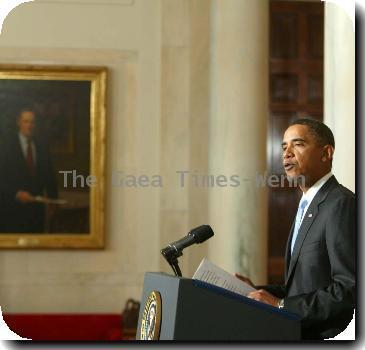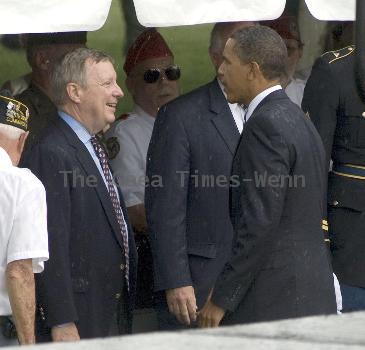AP source: Obama to choose Pentagon veteran Clapper as next national intelligence director
By Kimberly Dozier, APFriday, June 4, 2010
AP source: Pentagon official tapped as intel chief
WASHINGTON — President Barack Obama intends to nominate the Pentagon’s top intelligence official, James Clapper, as the next national intelligence director despite some objections from Capitol Hill, two senior administration officials said Friday.
Obama will announce his nomination of Clapper, a retired Air Force general, in a Rose Garden ceremony Saturday morning, said one of the officials. Both would speak only on condition of anonymity ahead of the announcement.
Clapper would replace retired Adm. Dennis Blair, who resigned last month after frequent clashes with the White House.
But Clapper’s own combative sparring with lawmakers during past congressional hearings made him an unpopular choice with leading legislators on both sides of the aisle. His critics question whether he will be able to counter Obama’s influential intelligence inner circle, which includes senior counterterrorism adviser John Brennan and CIA Director Leon Panetta.
The position of national intelligence director was created in 2004 to coordinate the 16 intelligence agencies in an effort to address the intelligence failures that led to the Sept. 11, 2001, terrorist attacks.
Clapper, a retired Air Force three-star general, served as director of the Defense Intelligence Agency, which often works closely with the CIA. In retirement, he became the first civilian director of the National Geospatial-Intelligence Agency, with a few years in private sector focusing on intelligence issues in between.
He’s known for blunt, sometimes salty speech, both in the Pentagon, and behind closed doors at congressional hearings.
Retired Vice Adm. Mike McConnell, the second DNI, had an intelligence background, and received fairly high marks in his role as President George W. Bush’s chief intelligence adviser.
But neither the first national intelligence director, John Negroponte, nor the most recent, Blair, had a long track record inside intelligence. As a result, both were criticized within the intelligence community for clashing with its insular culture.
Blair almost immediately fell into turf battles with Panetta. Blair objected to the CIA’s frequent use of covert action. And he butted heads with Panetta over who would had ultimate say in representing the DNI abroad, which had been handled by CIA station chiefs.
Blair wanted to have final say, but when Blair asked the White House to back him up, top counterterrorist adviser Brennan instead ruled in favor of Panetta.
Brennan was the administration’s first choice for DNI, but he was rejected by top senators because of his time at the CIA, during the time of waterboarding and renditions.
Clapper himself has long been a personal proponent for a strong DNI, and it cost him his job when he worked for then-Defense Secretary Donald H. Rumsfeld, according to one former senior U.S. official, who spoke on condition of anonymity to discuss the private meeting. In the summer of 2004, as Congress put the finishing touches on legislation creating the DNI, military and intelligence officials sat down to discuss out how the new boss would fit into their command structures.
Clapper, then the top official at the nation’s spy satellite agency, and Michael Hayden, who was the head of the National Security Agency, said the Pentagon would likely have to give up some authority under the new structure. But Rumsfeld strongly objected, the official said. Clapper subsequently fell out of favor with Rumsfeld, and was ultimately replaced, the official said.
Clapper is not the favorite choice on Capitol Hill, especially among Republicans.
“While Jim has served our nation well, he lacks the necessary clout with the president, has proven to be less than forthcoming with Congress and has recently blocked our efforts to empower the DNI, which is why at this time I’m not inclined to support him,” Sen. Kit Bond, the top Republican on the Senate Intelligence Committee, said in a statement.
The committee chairwoman, Sen. Dianne Feinstein, D-Calif., objected to the Clapper choice last week, saying she wanted a civilian in the role.
Rep. Pete Hoekstra, R-Mich, also said Clapper was the wrong person for the job. He said Clapper showed disdain for Congress and the oversight process in hearings on Capitol Hill.
Sen. Joe Lieberman, I-Conn., applauded the choice. Lieberman, chairman of the Senate Homeland Security Committee, said he looked forward “to working with him to determine whether the DNI needs additional authorities in order to lead and integrate the intelligence community.”
Another supporter, Rep. Rush Holt, D-N.J., who has worked with Clapper over the years, said Clapper “has learned to take Congress seriously and to accept and even welcome our oversight.”
Associated Press writers Matt Apuzzo and Adam Goldman in Washington and Anne Gearan in Singapore contributed to this report.
Tags: Barack Obama, Intelligence Agencies, Legislature Hearings, Military Intelligence, North America, United States, Veterans, Washington







